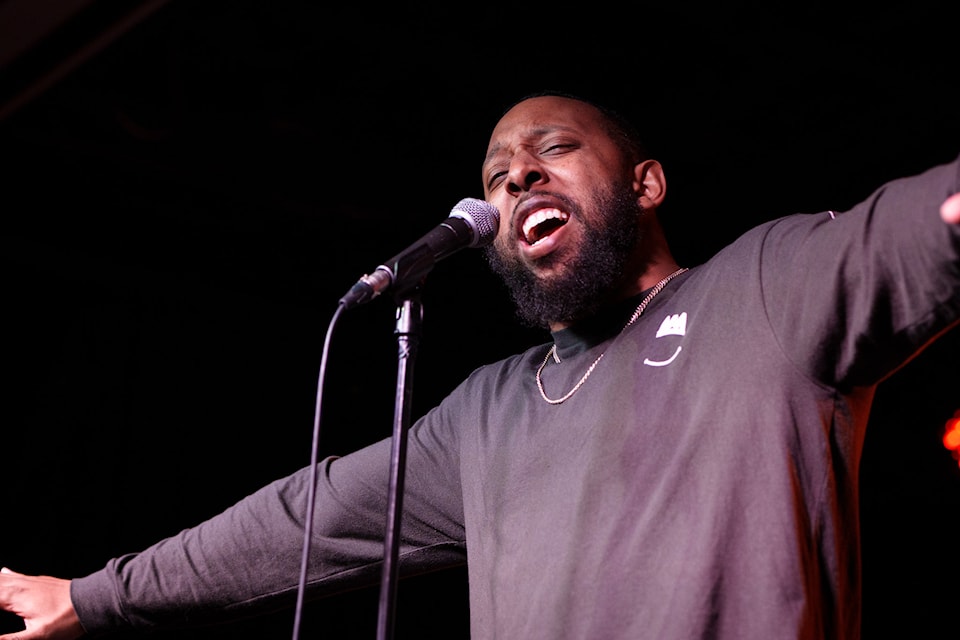Joshua “Scribe” Watkis received a text from his dad at 11:15 p.m. on Nov. 8, 2016, reading, “I think he’s going to win.”
This was the day that Donald Trump was first elected president and Watkis' dad, who lives in the U.S., was worried.
Watkis publicly vocalized his father's fear of hatred towards Black people following the election in a piece featured on CBC's Poetic Licence, The hate that killed Dr. King is not buried with him.
“And he sounds afraid, and I beg him to stay safe. I pray my father’s fate does not reflect the state of his country.," Watkis said in his spoken word piece featured on CBC’s Poetic License, a poetry style characterized by its intention to be performed before a live audience. "The hate that killed Dr. King is not buried with him. That he won’t be another Black man dragged out of bed. That the ghost of Emmett Till won’t use the backs of his bleeding eyelids to play flashbacks in his head.”
As a Black poet mentored in the early stages of his career, Watkis continues the cycle of uplifting young Black voices through his teachings. He has several mentorship opportunities for upcoming poets. He leads the Poetry Saved Our Lives workshop yearly, and individual mentorships with artists entering the industry like Jesse June-Jack, whose poetry also speaks about what Blackness and ancestry mean to him.
June-Jack is a Nigerian Canadian poet whose work covers topics ranging from love to mental health to social issues. He includes his experience immigrating to Canada from Nigeria in his writing, especially since adults are more susceptible to culture shock.
“And I think that there is a responsibility in the word 'ancestor,' and how this world asks that marginalized people live in the fulcrum of a vicious cycle that centres our gravity around our ancestors' grief while distorting the solace gifted to us through speech, blood, and thoughts — our dreams have been co-opted to further integrate into the waking machinations of oppression. And I think, how could one believe that our ancestors would dream of this?” said June-Jack, in his piece A Passage of Random Thoughts Derived in No Order.
As a Black poet, June-Jack said audiences have perceptions about what Black poets should write about, which can feel very restrictive.
“I choose to express myself without having a limitation of who I am as a Black person, as an artist,” he said.
June-Jack said poetry includes addressing a variety of topics. Trauma, in particular, is significantly involved in shaping identity and art for many artists of colour, but he said writing about himself as an individual is a form of resistance alone.
“As a Black poet, I think one of the things people tend to think about when they see or when they hear that someone is a Black poet, they have a framework of what that person’s artistry inherently looks like, so a lot of poems that might talk about protest or just one's Blackness,” he said.
“And my poems have gone into that but I think that one of the more important things that I found doing this and learning from other Black pets as well, is that that also tends to feed into a stereotype or narrative that that’s all you are and that's all we can perform,” June-Jack said
His experiences before immigrating to Canada and after have shaped his artistry. June-Jack said when he first started writing he was heavily influenced by hip-hop. Now when he writes he’s inspired by himself and his own experiences.
Tracy John is a Grenadian-born and Durham-based spoken word poet who created opportunities for young Black women poets through her yearly spoken word and music showcase, I am woman, I am enough.
“So I always make sure that I invite one younger poet," she said. "When I talk about young, I don’t mean young in age, but I’m talking about someone, for example, who may not want to have stepped out, you know, just to give them that stage.”
John shares her passion for her heritage in her poetry and enjoys sharing it with other Caribbean people.
“That poem is not just for me and people from Grenada," she said. "I have performed that poem and people from all different countries from the Caribbean will say, ‘Are you sure this is for Grenada? This sounds like Jamaica. This sounds like Saint Lucia.' And I, really, really, really love that. Because even though it’s about Grenada I love giving people that nostalgic feeling that they are back home.”
Watkis said one of his favourite pieces right now is his piece called Passing the Buck, which explores the history of homophobia in Jamaica and how it stems from colonialism.
“I’m not a fan of white people talking about my culture and where I come from surrounding homophobia, but then not talking about the history of how Jamaica became such a homophobic country in the first place, and that’s a result of slavery and colonialism, yes, this is wrong," he said. "Just because of how it came in doesn’t mean our homophobia isn’t wrong but we still need to look at the context of how it came.”
Watkis said if not for his mentor, Dwayne Morgan, the “godfather of Canadian spoken word,” he and slam poetry wouldn’t be what they are today.
“Spoken word wasn't always an accepted form of poetry in Canada. The Canadian League of Poets, if you know anything about them, originally, wouldn't accept spoken word poets as part (of the) legitimate poets in this country, and it had to be fought for having this black form, as a way of uplifting black voices," he said.
"It wasn't considered even a form of poetry until a group of poets headed by Lillian Allen, sought to have spoken word recognized as a legitimate form of poetry in this country,” Watkis said.




